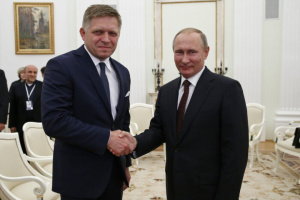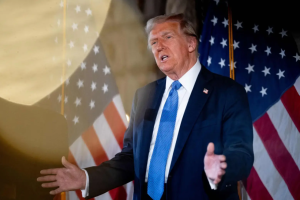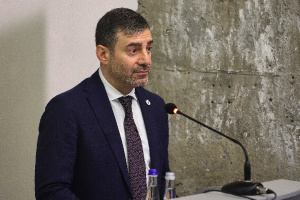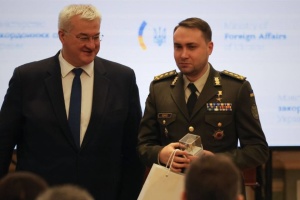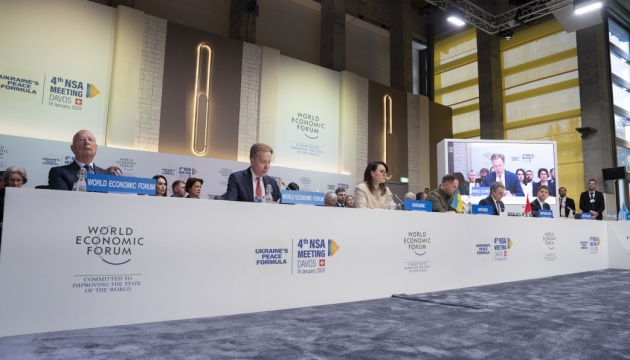
Davos meeting: security, foreign policy advisors address five points of Ukraine’s Peace Formula
That’s according to the Ukrainian President’s press service, Ukrinform reports.
In Davos, the participants in the meeting of national security and foreign policy advisors on the implementation of the Peace Formula addressed the remaining five points of the Ukrainian Peace Formula and the progress in their implementation, the report reads.
These include "Withdrawal of Russian troops and cessation of hostilities", "Restoration of justice", "Environmental safety", "Preventing escalation and repetition of aggression", and "Confirmation of the end of the war".
Representatives from Lithuania and Ukraine's Defense Minister Rustem Umerov spoke of progress made by the working group on the issue of "withdrawal of Russian troops and cessation of hostilities." In particular, the team proposed that an international working group be set up at the level of defense ministers and national security advisors. It should be tasked with drafting an international agreement calling on Russia to cease hostilities and pull its forces from Ukraine. It is also necessary to jointly develop a mechanism for the withdrawal of Russian troops and armed formations from the occupied territories of Ukraine. This should include the withdrawal of Russian units and servicemen from temporarily occupied territories; disbanding and complete disarmament of military terrorist organizations in temporarily occupied territories; and the removal of military equipment and weapons from the temporarily occupied territories for their further destruction.
Representatives from the Netherlands, Prosecutor General Andriy Kostin, and Deputy Minister of Justice of Ukraine Iryna Mudra presented their developments on "Restoration of Justice".
They noted that efforts to ensure Russia's accountability are based on five important components: ensuring effective investigations at the national level; securing accountability for the crime of aggression; continuing strategic partnership with international justice mechanisms; fostering bilateral and multilateral interstate partnership; and ensuring payment of reparations to Ukraine and the Ukrainian people by Russia in line with international law.
“To date, we have registered up to 120,000 cases of war crimes. We have pressed charges against 477 individuals, indicted 319, and convicted 77. We have diversified our resources and efforts by setting up nine regional war crime units, along with specialized units at the central level – addressing conflict-related sexual violence, war-related environmental damage, and deportation of Ukrainian children,” Andriy Kostin said.
He also noted that launching the International Center for the Prosecution of the Crime of Aggression is a significant step forward in restoring justice. According to the top prosecutor, the final step in this direction would be setting up the ad hoc Special Tribunal for the Crime of Aggression.
“It is crucial that our common efforts are directed towards expanding the support for the Tribunal and making it functional,” the prosecutor general emphasized.
Iryna Mudra emphasized the importance of not only further strengthening sanctions pressure on the aggressor state, but also creating a compensation mechanism to compensate for the damage to the victims and restore the country. According to her, the international compensation mechanism should consist of three elements: International Register of Damage, Compensation (or Claims) Commission, and Compensation Fund, which should be filled primarily with Russian sovereign assets.
The deputy minister of justice urged the states to follow through with their obligation to cooperate and invoke countermeasures in order to enable confiscation of Russian assets in line with international law.
Representatives from Germany, Finland, Bulgaria, First Deputy Prime Minister of Ukraine Yulia Svyrydenko, and Ecology Minister Ruslan Strilets presented the working group's developments on Environmental Safety. Ruslan Strilets emphasized that greenhouse gas emissions caused by the war in Ukraine exceed the total emissions recorded in Austria.
“A year ago, there were 97 million tons of CO2 emissions. Today it’s 150 million tons of CO2. The world's efforts to achieve climate neutrality have been undermined,” he stressed.
In addition, according to Ruslan Strilets, the water that was lost as a result of Russians blowing up the Kakhovka HPP dam would have been enough to provide drinking water for the entire planet for two days.
In view of this, he emphasized the need to unify the methods of calculating losses and introduce the definition of "ecocide" in international law. The International Working Group on the Environmental Consequences of War, co-chaired by President’s Office chief Andriy Yermak and former Swedish Deputy Prime Minister and former Foreign Minister Margot Wallström, is currently working on the issue.
In particular, Margot Wallström noted that weapons and their use not only kill people, but also cause direct damage to the environment. According to her statement, since the beginning of the war in Donbas in 2014, almost 40% of Ukraine's environmentally valuable territories have experienced occupation, most of these in the last two years of the full-scale war. And about 10% of all of Ukrainian territory has suffered damage, according to experts.
Wallström said that the International Working Group on the Environmental Consequences of War will soon present its report, the Environmental Compact, to President of Ukraine Volodymyr Zelensky. This document will contain many specific recommendations for both Ukraine and the international community.
“These recommendations fall into three areas. First – reduce the risk, second – ensure that there is accountability, and third – Ukraine should rebuild green and climate-friendly,” she emphasized.
Wallström also noted that Ukraine is the first country to prioritize environmental issues in the peace plan, and recognized that the future health and security of the nation will be partially determined by the impact of war on the environment.
“Ukraine’s commitment to the environmental consequences of the war is thus forging a new path. It is creating a blueprint for recognizing the dangers of these sometimes invisible but often deadly effects of war,” she concluded.
Head of the Presidential Office Andriy Yermak and a representative from the United Kingdom presented the item "Preventing the escalation of war and repetition of aggression".
In particular, Yermak spoke about the development of the draft Kyiv Security Compact, which later formed the basis of the G7 Joint Declaration of Support for Ukraine, adopted in Vilnius in July 2023. Two days ago, in Kyiv, the leaders of Ukraine and the United Kingdom signed a bilateral agreement on security cooperation, which became the first document to further the Vilnius Declaration. The head of the President’s Office emphasized that the agreement between Ukraine and the UK is a substantial document that covers all important issues of cooperation.
“This agreement is a good example for the other 30 signatories to the G7 Joint Declaration,” the report reads.
According to Yermak, it is crucial that countries beyond the European region and North America understand that the brutal war of aggression unleashed by Russia against Ukraine has global implications and affects each and every state throughout the world.
“We want our Formula to become global. We want the whole world to use our experience, to learn from our lessons and to utilize our tools and readymade solutions. So that any other aggression in any other part of the world could be prevented,” Yermak said, adding that a just, lasting and sustainable peace is only possible if all partners stand united.
For his part, Ihor Zhovkva noted that the G7 Joint Declaration of Support for Ukraine is the basis for a new comprehensive system to prevent the escalation of the war and the recurrence of aggression. Currently, 15 more countries have confirmed their interest in starting bilateral consultations on security commitments for Ukraine.
“We continue working with partners to ensure that more countries join the Declaration, and not only of the European continent, but beyond. The ultimate result of the implementation of the point has to be updating the overall security structure in the Euro-Atlantic region and in the world based on Ukraine's experience, while taking into account the peculiarities of each region,” the official said.
Deputy Head of the President’s Office Andriy Sybiha and Minister of Justice Denys Maliuska spoke of the results of the working group on the implementation of Point 10, "Confirmation of the end of the war".
Maliuska reminded that Ukraine has repeatedly tried to negotiate mutual relations with Russia and draw up a relevant international agreement, and each time Russia has stopped fulfilling it and simply ignored it. This applies to the agreement on the common border, the "great" treaty on friendship and cooperation, the Budapest Memorandum, the Minsk agreements, and even the Pereiaslav Articles of 1659.
"We have learned from past mistakes. The treaty that will confirm the end of the war must be based on the Peace Formula, be multilateral, i.e. signed not only by Ukraine and Russia, but also by the guarantor countries, be comprehensive and regulate all areas affected by the war. The terms of the treaty must be clear and legally binding, and the treaty itself must be ratified by the parliaments of the participating countries," the Minister emphasized.
In addition, the event featured two special discussion sessions on food security and humanitarian issues of war, which had already been presented during the third meeting in Malta.
During a special session on Food Security, First Deputy Prime Minister Yulia Svyrydenko noted that this point of the Ukrainian Peace Formula has attracted considerable attention from the international community, as prices for some crops reached a historic world high in 2022.
Since then, a set of various measures has helped to restore food supplies to global markets and to the most vulnerable consumers. In December 2023, Ukraine managed to export over 7 million tons of agricultural products to the world, reaching almost pre-war levels. Prices for all key grains have also fallen to pre-war levels, which is a key indicator of the success of joint efforts, said Yulia Svyrydenko. Among the measures that have proved effective, she named the provision of navigation in the Black Sea by Ukraine and partners and the improvement of cargo transportation through the EU countries under the EU Solidarity Lanes initiative.
In addition, one of the most important elements of restoring food security is the supply of food to consumers in Africa. The Grain from Ukraine initiative of President of Ukraine Volodymyr Zelenskyy has helped to supply grain to the most vulnerable African countries.
"Ukraine will not rest on its laurels in fulfilling the goals of the Food Security clause of the Peace Formula. It is necessary to continue efforts to further improve the safety of navigation in the Black Sea," the First Deputy Prime Minister emphasized.
Dmytro Lubinets, Ukrainian Parliament Commissioner for Human Rights, and Baroness Helena Kennedy, co-chair of the Bring Kids Back UA International Task Force, a lawyer specializing in human rights, civil liberties and child protection, Director of the Human Rights Institute of the International Bar Association, spoke at a special session on Humanitarian Issues about the struggle to return Ukrainian children forcibly displaced or deported by Russia, illegally abducted and imprisoned civilians, and prisoners of war.
During the discussion, special attention was paid to enforced disappearances of children as a result of their deportation by the Russian Federation.
"According to official data, Russia has deported or forcibly displaced more than 19,500 Ukrainian children. So far, only 517 children have been returned home. As for adults, 2828 Ukrainians have returned to Ukraine, including only 150 civilians. Our task is to return everyone! Therefore, the international community must immediately consolidate its efforts in this direction!" emphasized Dmytro Lubinets.
He also noted that Ukrainians abducted by the Russian Federation are held in inadequate conditions, civilians and prisoners of war are illegally convicted and tortured. In this way, Russia is violating international humanitarian law.
According to the panelists, the International Coalition of Countries for the Return of Ukrainian Children should focus on coordinating the actions of the international community, including the countries of the Global South, to facilitate the return of Ukrainian children illegally displaced or deported by Russia.

